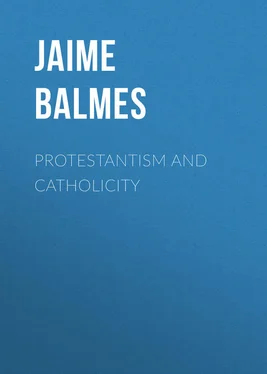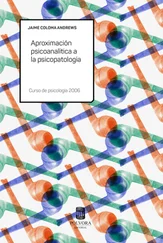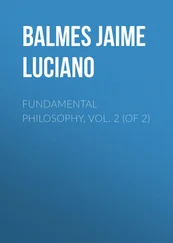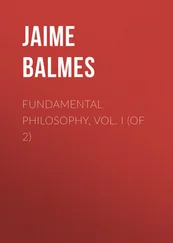Jaime Balmes - Protestantism and Catholicity
Здесь есть возможность читать онлайн «Jaime Balmes - Protestantism and Catholicity» — ознакомительный отрывок электронной книги совершенно бесплатно, а после прочтения отрывка купить полную версию. В некоторых случаях можно слушать аудио, скачать через торрент в формате fb2 и присутствует краткое содержание. Жанр: foreign_antique, foreign_prose, на английском языке. Описание произведения, (предисловие) а так же отзывы посетителей доступны на портале библиотеки ЛибКат.
- Название:Protestantism and Catholicity
- Автор:
- Жанр:
- Год:неизвестен
- ISBN:нет данных
- Рейтинг книги:3 / 5. Голосов: 1
-
Избранное:Добавить в избранное
- Отзывы:
-
Ваша оценка:
- 60
- 1
- 2
- 3
- 4
- 5
Protestantism and Catholicity: краткое содержание, описание и аннотация
Предлагаем к чтению аннотацию, описание, краткое содержание или предисловие (зависит от того, что написал сам автор книги «Protestantism and Catholicity»). Если вы не нашли необходимую информацию о книге — напишите в комментариях, мы постараемся отыскать её.
Protestantism and Catholicity — читать онлайн ознакомительный отрывок
Ниже представлен текст книги, разбитый по страницам. Система сохранения места последней прочитанной страницы, позволяет с удобством читать онлайн бесплатно книгу «Protestantism and Catholicity», без необходимости каждый раз заново искать на чём Вы остановились. Поставьте закладку, и сможете в любой момент перейти на страницу, на которой закончили чтение.
Интервал:
Закладка:
"A very interesting part of the work is that where he states the relations of religion and political freedom; shows that Catholicity is by no means adverse to the latter, but, on the contrary, highly favorable to it; and proves by extracts from St. Thomas Aquinas and other great Catholic divines, that they entertained the most enlightened political views. On the other hand, he shows that Protestantism was unfavorable to civil liberty, as is evidenced by the fact, that arbitrary power made great progress in various countries of Europe soon after its appearance. The reason of this was, that the moral control of religion being taken away, physical restraint became the more necessary." The author, on this subject, naturally expresses a preference for monarchy, it being a cherished inheritance from his forefathers; but, it will be noticed that the principles which he lays down as essential to a right administration of civil affairs, regard the substance and not the form of government; are as necessary under a republican as under the monarchical system; and, if duly observed, they cannot fail to ensure the happiness of the people. This portion of the volume will be read with peculiar interest in this country, and ought to command an attentive consideration.
In preparing this edition of the work from the English translation by Messrs. Hanford and Kershaw, care has been taken to revise the whole of it, to compare it with the original French, and to correct the various errors, particularly the mistakes in translation. A biographical notice of the illustrious writer has also been prefixed to the volume, to give the reader an insight into his eminent character, and the valuable services he has rendered to his country and to society at large.
Baltimore, November 1, 1850.
NOTICE OF THE AUTHOR
James Balmes was born at Vich, a small city in Catalonia, in Spain, on the 28th of August, 1810. His parents were poor, but noted for their industry and religion, and they took care to train him from his childhood to habits of rigid piety. Every morning, after the holy sacrifice of mass, his mother prostrate before an altar dedicated to St. Thomas of Aquin, implored this illustrious doctor to obtain for her son the gifts of sanctity and knowledge. Her prayers were not disappointed.
From seven to ten years of age, Balmes applied himself with great ardor to the study of Latin. The two following years were devoted to a course of rhetoric, and three years more were allotted to philosophy; a ninth year was occupied with the prolegomena of theology. Such was the order of studies in the seminary of Vich. While thus laboring to store his mind with knowledge, Balmes preserved an irreproachable line of conduct. Called to the ecclesiastical state, he submitted readily to the strict discipline which this vocation required, and he was seen nowhere but under the parental roof, at the church, in some religious community, or in the episcopal library. At the age of fourteen he was admitted to a benefice, the revenue of which, though small, enabled him to complete his education. In 1826, he went to the University of Cervera, which at that time was the centre of public instruction in that part of Spain. It numbered four colleges, in all of which an enlightened piety prevailed, affording the young Balmes a most favorable opportunity of developing his rare qualities. Here, the frame and habit of his mind were observable to all, in his deep and animated look, in his grave and modest demeanor, and in his method of study. He would read a few pages over a table, his head resting upon his hands; then, wrapt in his mantle, he would spend a long time in reflection. "The true method of study," he used to say, "is to read little, to select good authors, and to think much. If we confined ourselves to a knowledge of what is contained in books, the sciences would never advance a step. We must learn what others have not known. During my meditations in the dark, my thoughts ferment, and my brain burns like a boiling cauldron."
Devoted to the acquisition of knowledge, he cultivated retirement as a means of facilitating the attainment of his object. His thirst for learning was so intense, that it held him under absolute sway, and he found it necessary at a later period to offer a systematic resistance to its exclusive demands. Pursuing his favorite method of study, Balmes remained four years at the University of Cervera, reading no other works than the Sum of St. Thomas, and the commentaries upon it by Bellarmine, Suarez and Cajetan. If he made any exception from this rule, it was in favor of Chateaubriand's Génie du Christanisme . "Every thing," said he, "is to be found in St. Thomas; philosophy, religion, politics: his writings are an inexhaustible mine." Having thus strengthened his mind by a due application to philosophical and theological studies, he proceeded to enlarge his sphere of knowledge by reading a greater variety of authors. In taking up a work, he first looked at the table of contents, and when it suggested an idea or fact which seemed to open before him a new path, he read that part of the volume which developed this idea or fact; the rest was overlooked. In this way, he accumulated a rich store of varied erudition. At the age of twenty-two he knew by memory the tabular contents of an extraordinary number of volumes; he had learned the French language; he spoke and wrote Latin better than his native tongue, and had been admitted successively to the degrees of bachelor and licentiate in theology. The virtues of his youth, far from having been weakened by these studies, had acquired greater strength and maturity. As he approached the solemn period of his ordination, he became still more remarkable for the gravity and modesty of his deportment. He prepared himself for his elevation to the priesthood by a retreat of one hundred days. After his promotion to the sacerdotal dignity, which took place in his native city, he returned to the University of Cervera, where he continued his studies, and performed the duties of assistant professor. Here also he began to manifest his political views; but, always with that discretion and moderation for which the Spanish clergy have been with few exceptions distinguished during the last twenty years. At that period Spain was agitated by two conflicting parties, that of Maria Christina and the other of Don Carlos. Balmes avoided all questions which were rather calculated to encourage the spirit of faction than promote the general interest of the country. In 1835 he evinced this circumspection in a remarkable degree, when the doctorate which had been conferred upon him, required him to deliver an address in honor of the reigning monarch. Maria Christina was then the queen regent, and civil war was about to commence in the mountains of Catalonia; but Balmes performed his task without allusion to politics, and without offending the adherents of either party.
After two years of study at Cervera, where he applied himself to theology and law, our author returned to Vich, where he determined to spend four years more in retirement, for the purpose of maturing his character and knowledge. In this solitude, he devoted himself to history, poetry and politics, but principally to mathematics, of which he obtained a professorship in 1837. During all these literary labors, Balmes was actuated by a lively faith, and a sincere, unassuming piety. Religious meditation, intermingled with scientific reflections, was the constant occupation of his mind; he did not neglect, however, the exterior practices of devotion. Besides the celebration of the holy sacrifice, he frequently visited the blessed sacrament, and paid his homage to the B. Virgin in some solitary chapel. The Following of Christ , the Sum of the angelic doctor, and the Holy Scriptures, were always in his hands, and he took pleasure in reading the ascetic writers of his own country. In this way did he prepare himself, until the age of thirty, to become one of the most solid and gifted minds of our time, and to act the important part to which he was called by Divine Providence.
Читать дальшеИнтервал:
Закладка:
Похожие книги на «Protestantism and Catholicity»
Представляем Вашему вниманию похожие книги на «Protestantism and Catholicity» списком для выбора. Мы отобрали схожую по названию и смыслу литературу в надежде предоставить читателям больше вариантов отыскать новые, интересные, ещё непрочитанные произведения.
Обсуждение, отзывы о книге «Protestantism and Catholicity» и просто собственные мнения читателей. Оставьте ваши комментарии, напишите, что Вы думаете о произведении, его смысле или главных героях. Укажите что конкретно понравилось, а что нет, и почему Вы так считаете.












